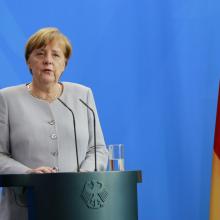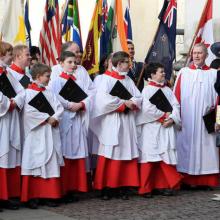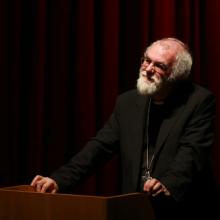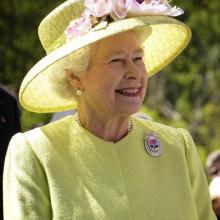Britain
RISHI SUNAK'S ASCENSION in October as British prime minister sparked celebration among some as he became the United Kingdom’s first nonwhite and non-Christian leader. Yet, this evolution comes with some awkwardness. The Church of England is an “established” church in which both monarchy and government play official roles. Sunak’s religious identity remains irrelevant for leading Parliament, but his status as a practicing Hindu would seem to impinge on his ability to discern which Anglican priests are best suited for leadership roles within the church hierarchy.
Raising this concern is not an argument that all prime ministers must be Christian — the U.K. rightly has no religious test for the role, as Sunak’s elevation demonstrates. But his ascension reveals a problem with not fully separating church and state. The Church of England now finds itself with a non-Christian in the ecclesial hierarchy. The roles of the monarch and prime minister in church affairs are in modern times more ceremonial than substantive, but Sunak reveals the problem with the entanglement both in principle and in practice.
May grew up in southeast England, the daughter of a Church of England vicar at a time when much of the nation was, by default, Anglican. In the 1950s and ’60s, the majority of people were married, baptized, and had their funerals in the Church of England, the established church. It was also a time when, despite the nation’s Christianity, few spoke about their faith, or about that of politicians.
Pope Francis urged the United Nations on March 28 to seek the "total elimination" of nuclear weapons, speaking as the United States and some other major powers boycotted a conference considering a global ban.
In a message to the conference that started in New York on March 27, Francis called on nations to "go beyond nuclear deterrence" and have the courage to overcome the "fear and isolationism" he said was prevalent in many countries today.

Image via 360b/Shutterstock.com
On Dec. 6 German Chancellor Angela Merkel called for face-covering veils to be banned in Germany, reports the Washington Post.
“The full veil is not appropriate here, it should be forbidden wherever that is legally possible,” said Merkel, speaking to attendees of the Christian Democratic Union's conference.

Image via REUTERS/Hannah McKay/RNS
Swastikas found in a children’s playground in London are the latest sign of anti-Semitism on the rise in Europe.
The hand-drawn swastikas appeared on four consecutive days, June 14-17, in a park in the Stamford Hill neighborhood, The Guardian newspaper reported June 20. A home for British Jewish veterans is nearby.

Image via REUTERS/Tim Wimborne/RNS
Burkinis aren’t showing up at the beaches on either side of the English Channel yet, but the thought that the full head-to-ankle swimsuit might catch on among Muslim women in Europe has already sparked lively debates in Britain and France.

Image via Hillsong Church London / RNS
Church closings are nothing new in the United Kingdom.
In the past six years, 168 Church of England churches have closed, along with 500 Methodist and 100 Roman Catholic churches.
“Christianity in Britain has seen a relentless decline for over 100 years,” says Linda Woodhead, a sociologist at Lancaster University.

Image via PHOTOCREO Michal Bednarek/Shutterstock.com
Britain’s Parliament held a boisterous debate Jan. 18 on a proposal to ban Donald Trump from the country in a rebuke of his call to block Muslims from entering the United States. The topic drew plenty of support from the British lawmakers, who don’t actually have the power ban anyone. The debate did allow members of Parliament to vent their frustrations about Trump’s comments.
Rob Lawrie with Bahar Ahmadi. Image via Twitter
"I had told her father 'no' many times," Lawrie said in his small suburban-style house in Guiseley, 210 miles (335 kilometers) north of London. "But half past 10 one rainy night, when she fell asleep on my knee as I was leaving for the ferry, I just couldn't leave her there anymore. All rational thought left my head."

Image via chrisdorney / Shutterstock.com
Almost 1,600 years after St. Augustine founded the first Roman Catholic church at Canterbury in 597 C.E., the British people have been told in no uncertain terms that they’re no longer living in a Christian country.
A sensational report released this week by the Commission on Religion and Belief in British Public Life, challenges this country’s time–tested moral and public values system. In language that raises eyebrows — and tempers — the report says United Kingdom (U.K.) should cut back the Christian tone of major state occasions and shift toward a “pluralist character.”
Events such as a coronation should be changed to be more inclusive, it said, while the number of bishops in the House of Lords should be cut to make way for leaders of other religions.

Image via InsectWorld / Shutterstock.com
The British Parliament voted Dec. 2 to begin a bombing campaign in Syria in order to disrupt ISIS.
The vote took place after a contentious ten-hour debate in the House of Commons. Prime Minister David Cameron’s comments that those opposed to the bombing campaign are “terrorist sympathisers” hung in the background of the debate.
The first Muslim to serve in a British Cabinet resigned Tuesday over her government’s “morally indefensible” policies in Gaza and its role in the Middle East peace process.
Baroness Sayeeda Warsi, who served as senior Foreign Office minister for faith and communities, announced her decision on Twitter, saying: “With deep regret I have this morning written to the Prime Minister & tendered my resignation. I can no longer support Govt policy on #Gaza.”
In her resignation letter, Warsi wrote: “I believe our approach in relation to the current conflict is neither consistent with our values, specifically our commitment to the rule of law and our long history of support for International Justice.”
Labour leaders and human rights groups have criticized Britain’s Conservative government, led by Prime Minister David Cameron, in recent weeks for not unequivocally condemning Israel’s handling of the Gaza crisis.
Conservative leaders expressed disappointment over Warsi’s “unnecessary” resignation on Tuesday, while Labour opposition leader Ed Miliband said Warsi had acted with “principle and integrity” in deciding to step down.
The decision by the Church in Wales to consecrate women bishops means the Church of England — the mother church of the worldwide Anglican Communion — will be the last in Britain to admit women as bishops.
Cheers erupted in a hall at Lampeter, Ceredigion in Wales, when the 144-member governing body of the Welsh church announced the result of the vote on Thursday. A similar bill failed narrowly in 2008.
While the U.S. continues to debate whether the president has legal authority to order the drone killing of American citizens, it seems the British have found their answer to the question. According to The Independent:
“The Government has secretly ramped up a controversial programme that strips people of their British citizenship on national security grounds – with two of the men subsequently killed by American drone attacks.
“An investigation by the Bureau of Investigative Journalism for The Independent has established that since 2010, the Home Secretary, Theresa May, has revoked the passports of 16 individuals, many of whom are alleged to have had links to militant or terrorist groups.”
VATICAN CITY — A top Vatican official blamed the media for “derailing” his recent remarks on possible legal protections for unmarried couples, while reaffirming his support for British and French bishops who have been vocal opponents of same-sex marriage.
Speaking at a Vatican press conference on Monday, Archbishop Vincenzo Paglia, head of the Pontifical Council for the Family, had acknowledged that nations could find “private law solutions” to protect the rights of unmarried couples — including, potentially, gay and lesbian couples.
Paglia also said the church should support the repeal of laws that criminalize homosexuality in various countries.
His remarks were widely repeated, with some interpreting it as a softening of the Vatican’s stance just as bishops in France and Britain are furiously opposing the legalization of same-sex marriage.
CANTERBURY, England — New figures from the 2011 Census show that the number of people who identify as Christians in England and Wales has fallen by 4 million over the last 10 years.
The data shows that numbers fell from 37.3 million in 2001 to 33 million last year.
The statistics came as the outgoing archbishop of Canterbury, Rowan Williams, claimed that English cathedral congregations are growing dramatically, challenging the claim made by secularists that the Church of England is fading in Britain.
LONDON — As Britain awaits the appointment of the next archbishop of Canterbury to lead both the Church of England and the far-flung Anglican Communion, there's renewed attention on the woman who officially gets the final say: Queen Elizabeth II, the "Defender of the Faith."
The current archbishop, Rowan Williams, ends his 10-year tenure in December. A Church of England committee is sifting through candidates — two of whom will be submitted to Prime Minister David Cameron, whose top choice will be submitted to the queen for final approval.
When he announced his retirement last March, Williams, 62, famously said his successor will need "the constitution of an ox and the skin of a rhinoceros.”
Politicians and religious leaders say the next archbishop will need those qualities and more to handle deep divisions in the British church over female bishops and North/South divisions among his 77 million-member global flock over sexuality.
But he'll also need something else: the ability to envision life when Elizabeth — who turns 87 next year — is no longer on the throne, and when Britain is no longer a Christian-majority country.
LONDON — Britain's powerful media advertising watchdog has banned a Christian group from claiming on its website and brochures that God's cure-all powers can heal a string of medical ailments.
The Advertising Standards Authority, the independent regulator of advertising in all British media, ruled that the ads generated by the group Healing on the Streets are irresponsible and misleading.
The ASA, whose tight rules are considered among the world's most stringent, cites a leaflet produced by the group from its center in the spa town of Bath, England, claiming that God "can heal you from any sickness."








